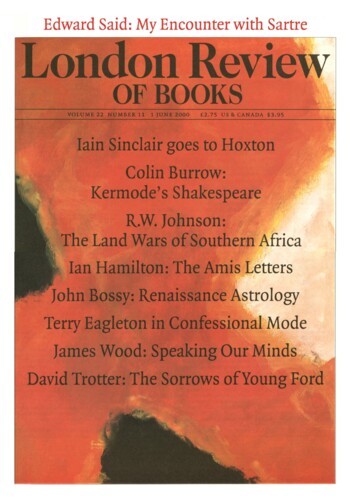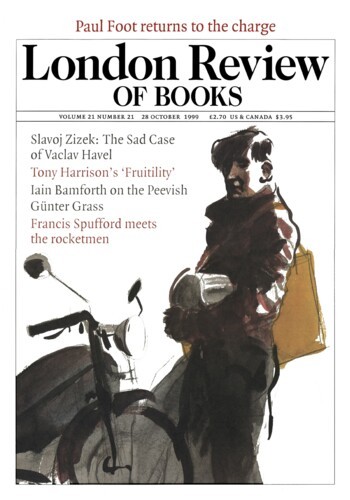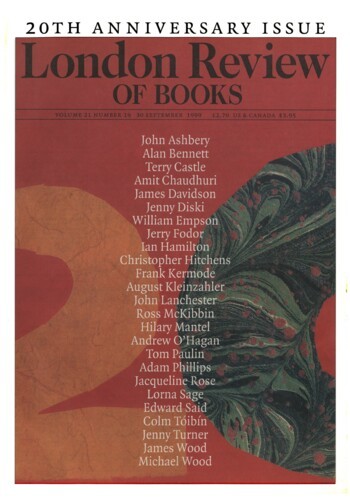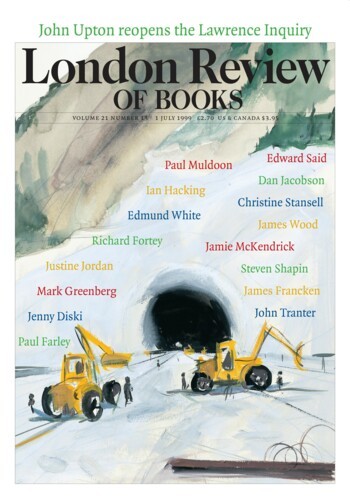Edward Said
Edward Said, who taught English and comparative literature at Columbia, was the author most famously of Orientalism. His other books include The Question of Palestine, Covering Islam: How the Media and the Experts Determine the Way We See the Rest of the World, Culture and Imperialism and Out of Place: A Memoir. He was also an accomplished pianist, and founded the West-Eastern Divan orchestra with the conductor Daniel Barenboim in 1999. He wrote forty pieces for the LRB on subjects including late style, the belly-dancer Tahia Carioca, meeting Sartre, and the Oslo Accords, ‘an instrument of Palestinian surrender, a Palestinian Versailles’. Said’s friend and former neighbour Michael Wood wrote about him in the paper after his death in 2003.
Diary: My Encounter with Sartre
Edward Said, 1 June 2000
Once the most celebrated intellectual, Jean-Paul Sartre had, until quite recently, almost faded from view. He was already being attacked for his ‘blindness’ about the Soviet gulags shortly after his death in 1980, and even his humanist Existentialism was ridiculed for its optimism, voluntarism and sheer energetic reach. Sartre’s whole career was offensive both to the so-called Nouveaux Philosophes, whose mediocre attainments had only a fervid anti-Communism to attract any attention, and to the post-structuralists and Post-Modernists who, with few exceptions, had lapsed into a sullen technological narcissism deeply at odds with Sartre’s populism and his heroic public politics. The immense sprawl of Sartre’s work as novelist, essayist, playwright, biographer, philosopher, political intellectual, engaged activist, seemed to repel more people than it attracted. From being the most quoted of the French maîtres penseurs, he became, in the space of about twenty years, the least read and the least analysed. His courageous positions on Algeria and Vietnam were forgotten. So were his work on behalf of the oppressed, his gutsy appearance as a Maoist radical during the 1968 student demonstrations in Paris, as well as his extraordinary range and literary distinction (for which he both won, and rejected, the Nobel Prize for Literature). He had become a maligned excelebrity, except in the Anglo-American world, where he had never been taken seriously as a philosopher and was always read somewhat condescendingly as a quaint occasional novelist and memoirist, insufficiently anti-Communist, not quite as chic and compelling as (the far less talented) Camus.‘
In Memory of Tahia: Tahia Carioca
Edward Said, 28 October 1999
The first and only time I saw her dance on the stage was in 1950 at Badia’s Casino, in Giza, just below where the Sheraton stands today. A few days later, I saw her at a vegetable stand in Zamalek, as provocative and beautiful as she had been a few nights before, except this time she was wearing a smart lavender suit and high heels. She looked me straight in the eye but my 14-year-old flustered stare wilted under what seemed to me her brazen scrutiny, and I turned away. I told my older cousin’s wife Aida with shamefaced disappointment about my lacklustre performance with the great woman. ‘You should have winked at her,’ Aida said dismissively, as if such a thing were even imaginable. Tahia Carioca was the most stunning and long-lived of the Arab world’s Eastern dancers (belly-dancers, as they are called today). Her career lasted sixty years, from her first days as a dancer at Badia’s Opera Square Casino in the early Thirties, through the rule of King Farouk, of Gamal Abdel Nasser, Anwar al Sadat and Hosni Mubarak. Each of them, except, I think, Mubarak, imprisoned her at least once for various, mostly political offences. She also acted in hundreds of films and dozens of plays, took part in demonstrations, was a voluble, not to say aggressive member of the actors’ syndicate, and in her last years had become a pious (though outspoken) Muslim known to all her friends and admirers as ‘al-Hagga’. Aged 79, she died of a heart attack in a Cairo hospital on 20 September.‘
Hey, Mister, you want dirty book? The CIA
Edward Said, 30 September 1999
E.P. Thompson called it the ‘Natopolitan’ world: that is, not just Nato plus all the Cold War military and political institutions that were integral to it, but also a mentality whose web extended over a lot more activity and thought, even in the minds of individuals, than anyone at the time had suspected. Of course there were the revelations in the mid-Sixties about Encounter and the CIA, and later in the US and Britain a stream of disclosures about covert counter-insurgency in every form, from secretly underwritten academic research to assassinations and mass killings. Yet it still gives me an eerie feeling to read about people like George Orwell, Stephen Spender and Raymond Aron, to say nothing of less admirable characters of the Melvin Lasky stripe, taking part in surreptitiously subsidised anti-Communist ventures – magazines, symphony orchestras, art exhibitions – or in the setting up of foundations in the name of ‘freedom’ and ‘democracy’ against Soviet totalitarianism.’‘
John McEnroe plus Anyone: tennis
Edward Said, 1 July 1999
Of the several sports that have turned almost completely professional during the past three decades, tennis deserves a place of honour in what Christopher Lasch called the culture of narcissism. A sport of skilful, well-mannered ladies and gentlemen has metamorphosed into a brutal confrontation between unpleasant, physically overdeveloped and remorselessly single-minded hitters, which is controlled by agents, TV networks, tournament bosses, sports equipment conglomerates, automobile and, until recently, cigarette companies. At the same time, an ever-increasing number of former non-tennis countries, besides having the de rigueur national airline and lavish arms procurement agencies, today put on at least one international tournament a year. There are now Qatar and Dubai Opens, to say nothing of counterparts in Tashkent and Conakry. So along with the Grand Slam Big Four (Wimbledon, Sydney, Paris, New York) and the national tournaments, a complex web of satellite tournaments keeps the sizable corps of men and women pros, plus – in the case of top players – retinues that include trainer, coach, psychologist, lover and bodyguard, in business for 52 money-earning weeks a year.
Pieces about Edward Said in the LRB
Going Against: Is There a Late Style?
Frank Kermode, 5 October 2006
The odd thing is that most of the contributors to these books doubt whether it is possible to offer a clear and distinct idea of the subject under discussion. Indeed, Karen Painter, one of the...
A Narrow Band of Liberties: global order
Glen Newey, 25 January 2001
In Being and Nothingness Sartre has an admirable passage about the stubborn human tendency to ‘fill’, the fact that a good part of human life, in politics as elsewhere, is devoted to...
What nations are for
Tom Nairn, 8 September 1994
The politics of dispossession is nationalism – an over-generalisation which at once calls for precise qualification. It is quite true that not all nationalists are dispossessed: possessors...
In the Wilderness
W.J.T. Mitchell, 8 April 1993
The Foundation of Empire is Art and Science. Remove them or Degrade them and the Empire is no more. Empire follows Art and not vice versa as Englishmen suppose. William Blake,...
Off the edge
Frank Kermode, 7 November 1991
The Wellek Library Lectures at the University of California, Irvine, are meant to be about Critical Theory, and up to now they have, for good or ill, been faithful (in their fashion) to that...
Insults
Richard Wollheim, 19 March 1987
Professor Bernard Lewis enjoys a worldwide reputation as a scholar of Near-Eastern history, and in his most recent work, Semites and Anti-Semites, he has chosen to concentrate his formidable...
Textual Harassment
Claude Rawson, 5 April 1984
In a recent review in this paper, Edward Said used the word ‘narrative’ about thirty times. This might have seemed a lot even in the present state of litcritspeak, and even in an...
Arabs
Malise Ruthven, 18 February 1982
Edward Said is the first Palestinian to have stormed the East Coast literary establishment. His achievement has partly been the result of what his more paranoid opponents must regard as his...
Making peace
Dan Gillon, 3 April 1980
The Palestinian problem has been the subject of world-wide debate for more than a decade. Yet the issue is not well understood. The debate, for all its volume and intensity, has rarely managed to...
Read anywhere with the London Review of Books app, available now from the App Store for Apple devices, Google Play for Android devices and Amazon for your Kindle Fire.
Sign up to our newsletter
For highlights from the latest issue, our archive and the blog, as well as news, events and exclusive promotions.




